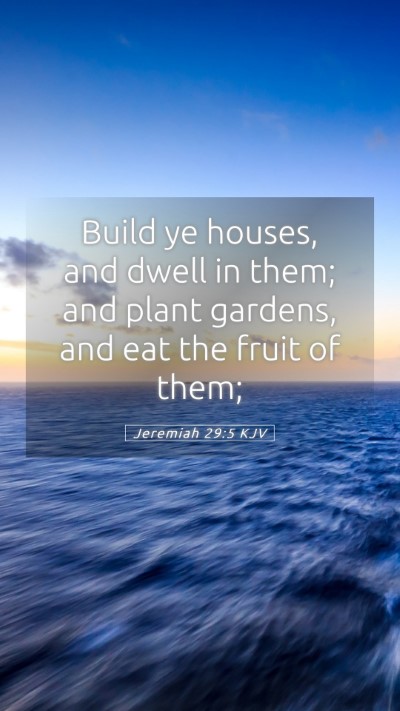Understanding Jeremiah 29:5: A Comprehensive Bible Verse Commentary
Jeremiah 29:5 states, "Build ye houses, and dwell in them; and plant gardens, and eat the fruit of them." This verse, part of a letter from the prophet Jeremiah to the exiled Israelites in Babylon, provides essential insights into the context of their captivity and offers them guidance on how to live within a foreign land.
Historical Context
During the time Jeremiah wrote this letter, the Israelites were facing the reality of exile, having been forcibly taken from their homeland to Babylon. Understanding the historical context is crucial for proper Bible verse analysis. This period was marked by a profound sense of loss and uncertainty for the Jewish people.
- Exile: The Israelites were not only displaced but also discouraged. Jeremiah's exhortation serves to uplift and encourage them to adapt and thrive in a new environment.
- Divine Guidance: The prophet Jeremiah, speaking God’s word, provides strategic insights on their conduct while in exile, emphasizing a form of survival and growth rather than despair.
Biblical Exegesis
The command to "build houses" and "plant gardens" signifies more than pragmatic survival. It reflects a divine intent for the Israelites to integrate into their surroundings while holding on to their identity and faith.
Key Themes in Jeremiah 29:5
- Hope and Future: Jeremiah communicates that despite their current plight, there is hope for the future (Jeremiah 29:11).
- Active Living: The exhortation to build and plant encourages proactive living, implying that they should not merely await their deliverance but instead create a life in their current situation.
- Cultural Adaptation: While keeping their faith, they are also called to adapt and contribute to the society they now inhabit, illustrating a balance between faithfulness to God and engagement with the world.
Bible Verse Interpretation
Matthew Henry posits that this instruction by Jeremiah indicates a degree of permanence in their situation, encouraging them to “seek the peace of the city” (Jeremiah 29:7) where they live. This commentary sheds light on the importance of community and social responsibility during testing times.
Albert Barnes highlights that these actions symbolize a "settling down" which signifies hope; that the Israelites should cultivate their surroundings and produce fruit, both literally and spiritually. Such interpretations illuminate the need for spiritual nourishment even in difficult circumstances.
Adam Clarke elucidates that the call to "eat the fruit of them" symbolizes enjoying the blessings and bounty that comes from diligent labor, reaffirming that God's provision can still be found even in exile.
Application of Jeremiah 29:5
For modern readers, Jeremiah 29:5 offers practical lessons on how to navigate life’s uncertainties. Whether in personal struggles or broader societal challenges, this verse encourages individuals to engage actively with their circumstances, to plant hope, and to build a future.
Practical Steps to Living out Jeremiah 29:5
- Engagement: Get involved in your community, contributing positively to societal growth while sharing your faith.
- Hopefulness: Maintain a hopeful outlook that God has a plan for your future, no matter the current circumstances.
- Spiritual Diligence: Remain committed to spiritual practices that nourish your faith and sustain you during trials.
Related Bible Cross References
- Jeremiah 29:11: A promise of hope and future from God.
- Isaiah 40:31: Encouragement to wait on the Lord for strength and renewal.
- Psalm 137: A reflection on the longing for homeland during exile.
Conclusion
In summary, Jeremiah 29:5 encapsulates profound truths about resilience, hope, and active engagement amidst adversity. By analyzing this scripture through the insights of esteemed biblical commentators, we glean a deeper understanding of how to apply these teachings in our lives and communities. This verse serves as a reminder that even in displacement, there is a divine call to grow, engage, and flourish.
For those seeking to delve deeper into Bible verse meanings, interpretations, and exegesis, this passage provides a rich tapestry of lessons that can be applied to both individual and communal experiences. Engaging with such verses through study groups or online platforms enhances our understanding and sympathy toward the biblical text.


